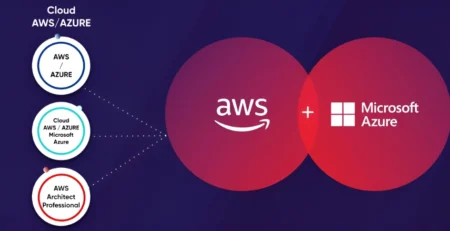Why is the Demand for Azure Training and Certification Increasing Rapidly?
Azure is one of the leading cloud platforms that offers a wide range of cloud services, including storage, networking, IoT, and others. Azure offers highly scalable and flexible cloud computing solutions, which is why medium and large-scale organizations prefer it. This translates to a significant growth in the demand for professionals with hands-on experience with Azure and its services. That’s where Azure training and certification courses are exceptionally beneficial, whether you are an IT professional or a student.
The demand for Azure certification and trained professionals was already pretty high in the job market. However, as more organizations are switching to cloud computing for scalable and faster operations, trends suggest that demand will continue to grow. Students and IT professionals can capitalize on this growing demand by enrolling in the right Azure course. This will help them gain practical experience and get a job-ready skill set.
Azure and the Benefits of Enrolling in the Azure Course and Training
Azure is a Microsoft product that provides end-to-end cloud computing services, covering building, deployment, and management. This platform is among the “big three” of the cloud computing world, and can be seamlessly integrated with other Microsoft products used in the organization. Additionally, Azure is incorporating AI tools and services, which are improving cost-efficiency and contributing to the overall performance of cloud services. The overall benefits offered by Microsoft Azure make it a reliable and highly functional platform for cloud computing services.
Career Growth with Certified Azure Training Course
Taking the Azure training and certification course will offer significant career growth and many other benefits. We have listed some of the key benefits below:
1. More Career Opportunities
Azure offers a wide range of services, which leads to increased and diversified job opportunities. You can opt for cloud security, IaaS, and SaaS, and choose from many different opinions. This allows you the flexibility to select the most suitable career path according to your skillset and interests.
2. Job Security
Cloud engineers are in high demand, and the experts suggest that this demand will continue to increase. This is the result of organizations switching to the cloud for storing their critical data and deploying software products. In conclusion, the jobs of an Azure cloud engineer are secure and safer, with low lay-off risks.
3. High-paying Position
After completing the Azure course and training, you will have a clear growth path. Additionally, the salary for cloud engineers is relatively high, even for entry-level professionals. You can start with a high salary and continue to have steady financial growth as an Azure cloud engineer.
4. Focused on Practical Skill Development
In the high-paced and dynamic IT environment, organizations look for candidates with practical experience. Partnering with the right Azure training provider will enable you to develop the required practical skills. Also, the skills that you gain during the training period will help you crack technical interviews.
5. Stronger and Visible Resume
After completing the training modules, you will be awarded a certificate that will demonstrate your practical skills and in-depth knowledge. Attaching the certificate to your resume not only improves your impression on the recruiter but also makes it more visible compared to others.
Career Choices with Professional Azure Training Course
We learned about the benefits of taking certified Azure training courses. Now, let’s take a look at the roles that you can get with this.
| Career Role | Primary Responsibilities | Experience Level | Key Skills Required |
| Azure Cloud Administrator | Manages Azure resources, user access, storage, and virtual networks. | Entry to Mid-level | Azure Portal, PowerShell, Networking, Resource Management |
| Azure Solutions Architect | Designs end-to-end Azure-based cloud solutions and oversees implementation. | Mid to Senior-level | Architecture Design, DevOps, Networking, Security, Cost Optimization |
| Azure DevOps Engineer | Implements CI/CD pipelines, automation, and continuous deployment on Azure. | Mid-level | Azure DevOps, Git, Jenkins, Docker, Kubernetes, Scripting |
| Azure Data Engineer | Builds and maintains data pipelines, manages data lakes, and performs analytics on Azure. | Mid to Senior-level | Azure Data Factory, Synapse, Databricks, SQL, Python |
| Azure Security Engineer | Secures Azure environments, manages firewalls, identity, and compliance. | Mid-level | Azure Security Center, AD, Key Vault, SIEM, Network Security |
| Azure AI Engineer | Develops and deploys AI and machine learning models using Azure AI services. | Mid-level | Azure Machine Learning, Python, Data Science, Cognitive Services |
| Azure Cloud Developer | Builds, tests, and deploys cloud-native applications using Azure tools and SDKs. | Entry to Mid-level | .NET, C#, Azure App Services, Functions, REST APIs |
| Azure Network Engineer | Manages Azure networking, VPNs, and hybrid connections. | Mid-level | VNet, ExpressRoute, Load Balancer, DNS, Network Security Groups |
| Azure Administrator Associate (Certified) | Handles day-to-day cloud operations, monitoring, and scaling. | Entry-level | Azure Resource Manager, Automation, Monitoring, Backup |
| Cloud Consultant (Azure) | Advises clients on Azure migration, deployment, and optimization strategies. | Mid to Senior-level | Cloud Strategy, Cost Management, Hybrid Solutions, Client Communication |
Latest Syllabus, Flexible Learning, and Other Reasons to Choose Rexton IT Solutions
If you are planning to grow your career in Cloud computing with Microsoft Azure training, Rexton IT Solutions has the perfectly planned certification course. With the latest syllabus and carefully designed lecture modules, you will learn all the core topics with practical assessments to solidify your learning. At Rexton IT Solutions, we offer both online and offline training methods so that you can learn flexibly, at your own pace. Moreover, you will have the following benefits:
- Easily accessible revision classes, helping you solidify the topics
- Practical approach to provide hands-on experience
- Industrially recognized certification
- Mock interviews with the latest questions
- Preparation for different Azure certification exams, such as AZ-900, AZ-104, and AZ-400
- Placement opportunities to kick-start your career
- Budget-friendly courses
In addition to Azure certification, we also offer other cloud training programs, including AWS course, GCP – Cloud Engineer, AWS-Cloud Security, Azure-Cloud Security, and More. Want to know about the registration process and course details? Contact Us!
FAQs
There are no strict educational qualifications required to learn Microsoft Azure and its services. However, having a degree, diploma, or prior experience with software development will definitely give you an edge over the competition.
No, you can also enroll in this course as an IT professional to learn new skills, switch to cloud computing from other branches, or grow your career in Azure services. Consequently, many professionals enroll in this course to develop their careers and get desired salary hikes.
Switching to DevOps with a cloud engineering base is a smart move and will help you skyrocket your career. This is a natural progression and is tried and tested by many professionals.
Here is the road map if you want to be a cloud security engineer with Azure training:
- Master Azure Fundamentals – Compute, Storage, Networking, Security
- Hands-on Practice – Deploy VMs, Web Apps, Databases, and Networks
- Learn IaC – Use ARM Templates or Terraform for automation
- Get Admin Skills – Manage users, security, and monitoring (Azure AD, Azure Monitor)
- Earn Certification – Aim for AZ-104: Azure Administrator Associate
- Advance Skills – Learn DevOps basics, scripting (PowerShell/Python), and CI/CD
- Build Projects – Host apps, automate deployments, and monitor performance.
There is no definitive answer to which cloud service provider is better. However, there are certain aspects where Microsoft Azure is more useful than AWS, which are mentioned below:
- Seamless Microsoft Integration – Works natively with Windows Server, Active Directory, and Office 365.
- Hybrid Cloud Capabilities – Strong hybrid solutions via Azure Arc and Azure Stack.
- Enterprise Adoption – Preferred by organizations already using Microsoft tools.
- Cost Management – More flexible pricing for Windows-based workloads.
- PaaS Offerings – Broader native tools for app development and DevOps.
- Compliance & Security – Extensive compliance portfolio, especially for government and finance sectors.











